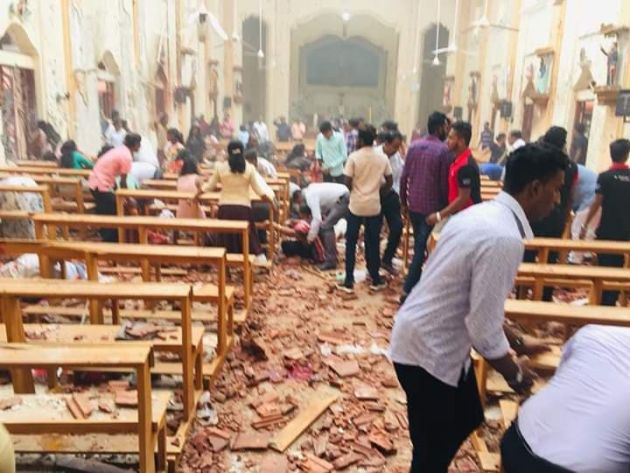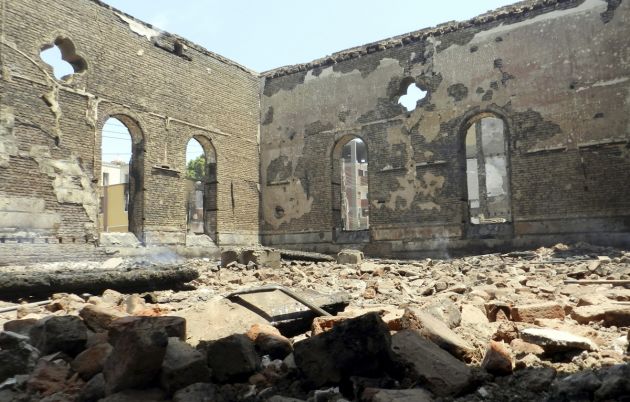Nearly 300 killed in Sri Lanka Easter Sunday bomb blasts at churches and hotels

A series of coordinated explosions struck churches and hotels in Sri Lanka on Easter Sunday, killing nearly 300 people and injuring hundreds drawing strong condemnation from religious and political leaders worldwide.
The BBC, quoting the police, reported that at least 207 people were killed and 400 hurt in the explosions on Christianity's holiest day. That toll later shot up to more than 290 killed and 500 seriously hurt.
There was no group immediately blamed or claiming responsibility for the slaughter.
The Guardian reported that three hours after the bombings, security forces surrounded a house in the Dematagoda neighbourhood of Colombo, where they arrested seven people.
Three police officers were killed in the raid.
Three were reported to have required immediate medical assistance. There was at least one explosion during the operation, which may have been caused by a suicide bomber.
Most of the victims were killed in attacks on three churches where worshippers were attending Easter Sunday services.
Three other bombings struck luxury hotels - the Cinnamon Grand, Kingsbury and Shangri-La - located in the heart of Colombo, killing at least 35 foreigners.
The World Council of Churches head Rev. Olav Fykse Tveit offered prayers and condolences £to all those who have lost loved ones in these appalling acts of violence."
Tveit said, "The targeting of churches in this manner is an attack on religious peace and harmony and on the social and cultural fabric of the nation, which has long struggled to uphold principles of religious harmony and diversity."
He said, "Such acts of violence undermine the sanctity of life and constitute a sacrilege in many senses. Even as we cry out against this sacrilege, we resolutely affirm that violence must not beget violence. In the spirit of the love of Christ, on this Easter Day, we hold fast to the belief that violence, hatred and death will not have the last word."
POPE FRANCIS
Pope Francis lamented the attack saying, "I wish to express my heartfelt closeness to the Christian community [of Sri Lanka], wounded as it was gathered in prayer, and to all the victims of such cruel violence."
Pope Francis spoke his words of solidarity at the conclusion of his Easter Urbi et Orbi address to the faithful in St. Peter's Square, Vatican News reported.
Francis said the multiple attacks on churches and hotels around Sri Lanka "have wrought grief and sorrow".
"I entrust to the Lord all those who have tragically perished," he said, "and I pray for the injured and all those who suffer as a result of this tragic event."
The leader of the Anglican Communion, Archbishop of Canterbury Justin Welby, wrote on Twitter: "Those affected by the appalling and despicable attacks on churches and hotels in Sri Lanka will be in the prayers of millions marking Easter Sunday around the world today."
The World Evangelical Alliance condemned in strongest terms the cowardly series of bombings on multiple churches and hotels in Sri Lanka.
Bishop Efraim Tendero, WEA Secretary General and CEO, said: "We are deeply saddened and troubled by the news of the targeted attacks on worshippers and other innocent people on Easter Sunday.
"We call on churches around the world to join us in prayer for those affected, and that God's strong and comforting presence may be with them in this tragedy. May God help them to hold onto the faith of the resurrection and experience the peace that transcends all understanding."
Ronald S. Lauder, president of the World Jewish Congress, which represents more than 100 Jewish communities worldwide, said, ""World Jewry — in fact all civilised people — denounce this heinous outrage and appeal for zero tolerance of those who use terror to advance their objectives."
U.S. President Donald Trump said, "Heartfelt condolences from the people of the United States to the people of Sri Lanka on the horrible terrorist attacks on churches and hotels," He tweeted, "We stand ready to help!"
Turkish President Tayyip Erdogan, said in a tweet, "I condemn in the strongest terms possible the Easter terror attacks in Sri Lanka. This is an assault on all of humanity," he tweeted.
IRANIAN FOREIGN MINISTER
Iran's Foreign Minister Mohammad Javad Zarif tweeted, "Terribly saddened by terrorist attacks on Sri Lankan worshippers during Easter. Condolences to friendly govt & people of Sri Lanka. Our thoughts & prayers with the victims & their families. Terrorism is a global menace with no religion: it must be condemned & confronted globally."
Cardinal Malcolm Ranjith, the Catholic Archbishop of Colombo, said it is "a very, very sad day for all of us."
"I wish, therefore, to express my deepest sorrow and sympathy to all those innocent families that have lost someone, and also to those who have been injured and rendered destitute," he continued.
Cardinal Ranjith said, "I condemn – to the utmost of my capacity – this act that has caused so much death and suffering to the people."
He also called on Sri Lanka's government to hold "a very impartial, strong inquiry and find out who is responsible behind these acts."
Out of Sri Lanka's total population of around 22 million, 70 percent are Buddhist, 12.6 percent Hindu, 9.7 percent Muslim, and 7.6 percent Christian, according to the country's 2012 census.
CNN identified the blast sites:
St Anthony's Shrine, Kochchikade
St Sebastian's Church, Negombo
Zion Church, Batticaloa
Cinnamon Grand, Colombo
Shangri-La Hotel, Colombo
The Kingsbury Hotel, Colombo
Near Dehiwala Zoo in Dehiwala-Mount Lavinia
A house in Mahawila Gardens, Dematagoda
The blasts ripped through three churches in the cities of Colombo, Negombo and Batticaloa at approximately 8:45 a.m. as worshipers were gathering for services, The Washington Post reported.
Explosions also took place at four hotels within Colombo, the nation's capital, police said, while an eighth blast occurred under a flyover within the city.
This is believed to be the most serous terror attack since the 2001 attacks on September 11.
